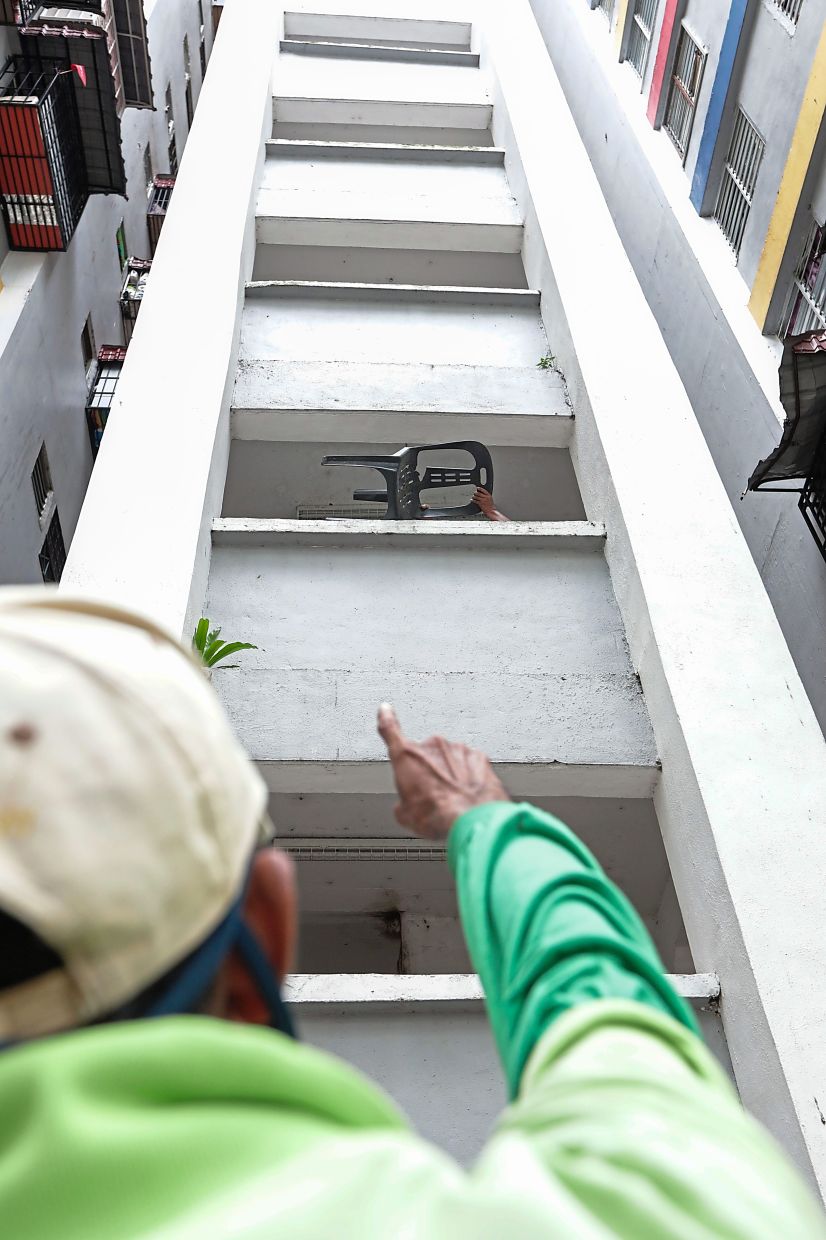A worker picking up rubbish left on the corridor of the 16th floor of a PPR in KL.
Cleaners and rubbish collectors in Kuala Lumpur say their job is one of the most dangerous as they face countless hurdles and difficulties in carrying out their duties.
Hundreds of them are not only at risk of being hit by “flying” objects, they are also exposed to hazardous waste disposed of by residents.
Dozens of workers, mostly foreigners, told StarMetro that cleaning government housing schemes like people’s housing projects (PPR) was the most unsafe.
“Apart from rubbish and food waste, we have to handle chemicals, broken glass and sometimes needles,’’ said 46-year-old Abeer (not his real name) from Bangladesh.
“We do not only empty bins but are also responsible for cleaning the common areas of the PPR, and bringing the waste, including litter, to the rubbish house,’’ added Pawan (not his real name), another cleaner from Bangladesh.
“Now we also have to clean rooftop ledges and awnings as people are throwing rubbish out of their windows and balconies which land there.
“And we have to do it with no safety gear, no gloves, nothing,’’ said the 55-year-old.
ALSO READ: Danger from falling litter persists
Pawan added that with more people discarding their rubbish irresponsibly, workers were concerned about their safety.
“We need safety helmets, proper footwear, goggles, gloves, masks and hand sanitiser especially when cleaning government housing schemes,’’ said Omar (not his real name) from Indonesia.
“The company expects us to put our lives at risk but they don’t provide us with anything to protect ourselves.
“Imagine having to dodge chairs, flower pots, human and cat faeces, and pick up hazardous materials like chemicals with our bare hands,’’ said the 51-year-old.
PPR Seri Pantai resident Abu Kassim Jan, 59, said there was no change in residents’ behaviour even though a boy was killed by a chair thrown from a higher floor five years ago.
Blok 102 chief Shamsuri Musa, 48, however, said there was less bulk waste being thrown from above.
“But they still throw water, old vegetables and food,’’ he added.
Shamsuri said that the netting Kuala Lumpur City Hall (DBKL) had installed at their PPR in Pantai Dalam to catch items thrown from above was always full of rubbish.
“After repeated notices telling people not to throw rubbish, I decided to put a sarcastic banner saying “Kalau tak nak dipanggil monyet, janganlah buang sampah di sini (If you don’t want to be called a monkey, then don’t throw rubbish here).
“I was angry. A boy lost his life here but people just don’t want to change their attitude,’’ added Shamsuri.
Enforce OSH laws
Street cleaners come into contact with hazardous materials like chemicals, blood, faecal matter, bodily fluids, disposed masks, broken glass, sharp objects, waste food, animal carcasses and improperly disposed personal items like sanitary pads, condoms as well as tissues, noted Prof Dr G. Jayakumar, who is dean of Manipal University College Malaysia’s Medical Faculty.
He said these workers were exposed to a variety of diseases ranging from gastroenteritis to asthma, bronchitis, allergies, skin conditions as well as lower back pain, slips, falls and heat stress.
ALSO READ: Still plagued by lethal litter habit (Poll Inside)
Prof Jayakumar said the Occupational Safety and Health Department (DOSH) might want to consider including cleaners under the mandate of the Occupational Safety and Health Act 1994.
“This will enable enforcement officers to implement and enforce the prescribed safety and health measures effectively for this group of vulnerable workers.
“These workers should also undergo periodic medical examination,” he said.
Alliance for Safe Community (Ikatan) chairman Tan Sri Lee Lam Thye said if employees were exposed to risks when carrying out their duties, the employer should be held accountable.
Lee, who was former chairman of the National Institute for Occupational Safety and Health, said foreign workers doing 3D (dirty, dangerous and difficult) jobs were often at risk.
“Employers who don’t protect their workers’ safety and infringe OSH policies should be fined and this includes organisations like Kuala Lumpur City Hall and their cleaning contractors too,’’ Lee said.
Prof Jayakumar added that the nature of waste cleaners’ work put them at risk of being carriers of infectious diseases like typhoid, cholera and hepatitis A.
“Vaccinations against common infectious diseases are strongly recommended.
“Illnesses and accidents can be minimised by the use of protective clothing, such as safety shoes, helmets, gloves and high-visibility vests or clothing.”
He added that general training in health and safety should be provided to street cleaners as well as an accessible area with washing and changing facilities, including to wash and dry clothes, a common room and a first aid room.
Meanwhile, when shown photos of waste cleaners at work at a KL PPR, a spokesperson from FT DOSH said the employer has a duty to ensure the health and safety of their employees.
“In this case, falling rubbish is dangerous and puts cleaners at risk.
“To minimise the risk, employers must provide their workers with safety helmets and personal protective equipment to protect them from flying objects,’’ he added.










